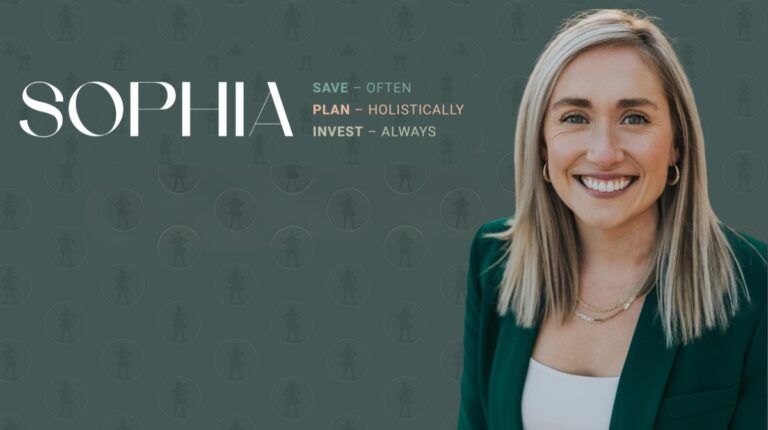By Madeline Barconi CFP®, ChFc®, CDFA®
•
October 15, 2024
Where do I start? There is an abundance of personal finance advice out there, easily accessible, with a quick Google search. As the chief (fill in the blank) officer of many things in our household, I’ve learned to automate as much as possible to avoid the perpetual ‘to-do’ list. I understand the feeling of being overwhelmed when it comes to managing your money. But remember, taking control of your finances can be empowering. Many of the clients I partner with have already achieved real wealth, so we are navigating their unique complexities. I also spend a great deal of time making real connections with their partner, their children, or really anyone they think would benefit from our experience and knowledge. As a result, I am able to work with younger clientele, often in the beginning or mid stages of their careers, thus making a really big impact. Not a year goes by without having some version of the “what do I need to be doing right now to be financially sucessful” conversation. As Warren Buffet says, “No one wants to get rich slowly.” He and I may differ on our choices of lunch, no Big Mac for me. However, we surely see eye to eye when it comes to the merits of having a healthy serving of patience with a side of humility. It’s that long-term thinking and that steady approach to building wealth with consistency and discipline that makes you truly wealthy. After all, he has accumulated 99% of his present wealth after the age of 50, but that was achieved by starting a lot earlier and incorporating really good habits. Having worked with hundreds of clients over the course of my career, I can confidently say that anyone who does the following on a regular and purposeful basis is destined for success. Plan, plan, plan. Did I mention I like to plan? I like to plan about planning. I am the person in your life who plans a year in advance down to the minute. It gives me comfort, and after having my son, that has ratcheted up even more. My best friend and I just had a “let me get the calendar out” to plan a Saturday night girl’s date conversation . I understand that doesn’t work for everyone, and thinking about life in more than 5-minute increments can be challenging. How many of us roll our eyes when we are stuck behind the guy at Starbucks who doesn’t know his order yet… Yikes, and those are small stakes. I can tell you with certainty what I’m doing tomorrow, quite precisely a week from now, and even one year is pretty clear. But zoom out, and it gets a little less clear, and anything beyond a couple of years is ambiguous at best. While I do not know at precisely what age I will retire or exactly how much money I will need when I do, I do know that I have never had a client tell me, “I wish I saved less for retirement.” Savings early and often is the key to a successful retirement. It’s never too early to start, and the sooner you begin, the more you’ll have when you need it. Ideally, you save at least 15% of your income towards some type of retirement plan, whether a company-sponsored retirement plan (401k, 403b, 457b), SEP IRA (for my self-employed bosses), SIMPLE IRA, or solo 401k. That 15% contribution includes your company match if applicable, but if you are someone who thrives on pushing yourself, cover the 15% yourself. At the very least, make sure you are contributing enough to get the match. Never, ever, ever walk away from free money. Pay attention to your vesting schedule as well, which is something I recently touched on in a benefits-focused webinar. Too much job hopping can seriously impair your savings. Sure, 15% sounds like a lot, but if you can work towards increasing your contributions automatically, even by 1% each year, you can get to critical mass faster than you think. Building good habits now goes a long way, put some of your current cash flow aside now for “future you” (even if you don’t know what that future will look like quite yet). You are rewarding yourself, and you will appreciate it more than you may realize in the present. Once your retirement savings are taken care of, the script gets flipped a bit. Rather than focus solely on the long term, we need to button up the new expenses, the known and unknown. For that, it is imperative to accumulate a 3–6-month emergency fund. 3-6 months’ worth of savings is a bit subjective, but from my vantage point, you should look at it in one of two ways: 3-6 months of expenditures, or if you do not have the best grasp on your spending, save 3-6 months worth of your after-tax income. So, you still live at home with your folks? Three months may suffice. Or you may be the type of person who sleeps better at night with a higher balance in your savings account helping you navigate life’s uncertainties; here, six months may be for you. This is a number that is best taken for a pulse check once a year with your advisor. I caution women, especially, from letting these savings get too high. A study from Fidelity showed women are more likely to hold onto cash compared to men, citing a lack of confidence in investing as a reason for this preference. Do not let that be you. Setting aside 5% of your take-home will get you to that 3-6 months range in no time and without a big lifestyle shift. What’s also nice about this is once you have accomplished this objective, you get to cross it off the list which feels really good. Hybrids… No, I am not here to recommend your next car purchase, but you could probably do worse for your budget and the environment. What I am talking about here is using tools that can be used in multiple ways, like a Swiss Army Knife or some other household hack. I realize my audience may not love the retirement conversation resurfacing here. With the workplace retirement plan in motion and the emergency fund with a checkmark next to it, contributing to a Roth IRA should be next on your list. The Roth IRA is a powerful tool; first and foremost, it is a tax-free growth vehicle. Accounts like these are rare, and if you want to truly level the playing surface with the IRS after years of them taking their piece, they won’t be in your pocket when it comes time to withdraw, as these funds are all for you. Just a reminder, from 2013 to 2023, the S&P 500 has gone up 9-12% annually on average (depending on the specific time frame) with a total return of 250-300%. When you invest over time, the combination of market growth and dividend reinvestment can lead to increased gains, all of which are tax-free so long as you keep the funds in a Roth IRA until you’re 59 and ½ and the funds have been in the account for five years (hello Roth conversions, more on that in a future post). Along with the tax-free growth, there is an “out clause,” so if you need access to the money before you turn 59.5, you can withdraw your basis (what you put into the account) at any time, penalty-free. Go ahead and leave the earnings behind to still keep growing for you. It’s like a secondary emergency fund. There are annual contribution limits to these accounts that go up every year with inflation. For 2024, the limit is $7,000. You should also be aware of the income limits to be able to contribute directly to these types of accounts. The income phaseout limit begins at $146,000 for a single filer and $230,000 for joint filers. If you are above these income limits, let’s chat . You can make “back door” Roth IRA contributions, but those need more delicate planning as the IRS has a lot of “if that, then this rules,” and it gets confusing quickly. If there is still more room in the budget and you want to keep it that way…skip having children. Kidding aside, just like I like to think of life in 5-year increments, I also like to think of my money in buckets. Compartmentalizing my capital makes it easier to track my progress. Not only are there “retirement” and “non-retirement” buckets, but there are also “taxable, tax-deferred, and tax-free buckets.” Ideally, we have money in all of these buckets, helping us save, invest, and spend in the most tax-efficient way. Investing in a regular brokerage account is filling up the “taxable” bucket. That means if you invest $10 from your paycheck and the underlying investment grows to $20, the $10 of growth will be taxed when you sell that investment. If you sell it in less than a year (short-term capital gains) and realize the gain, you will pay regular income tax. If you sell it at least a year after owning it (long-term capital gains), you will pay a more appealing (lower) rate of either 0%, 15%, or 20%, depending on your income. Having this type of account is nice because it is not tied down to any retirement restrictions or penalties. You have access to the funds whenever you need them. If you do not plan on doing anything with the money for five years or more, you should invest it more aggressively; if you plan on using it before then, invest it more conservatively. Find an asset allocation (your mix between stocks, bonds, and cash) that is appropriate for your unique situation. Back to the idea of having kids: They are a wonderful investment, and you may want to pair them with a 529 account. Obviously, there are many competing forces at work, especially in the department of family finances. We all know childcare is expensive, and there are so many ways parents are trying to make it work. The average cost of childcare in the US is anywhere from $10k-40k per year . Even the low end may equal the household car payments, the vacation budget, or a significant portion of your rent/mortgage payments. I bring that up because 18 years will go by quickly if you haven’t already been told that by everyone at this point, and the cost of college isn’t cheap and steadily rising. Just like saving for retirement, I approach saving for college in the same way, “save early and often.” 529 plans are state-specific but portable, meaning your child does not have to go to college in CO just because you have a CO 529 plan. The reason you would contribute to your state-specific plan is because certain states give you tax breaks for doing so. The tax savings are usually modest, but after all, you are given money for something you plan to do anyway. Every penny counts, so make sure you choose the plan that is most appropriate for you. Each 529 plan should have different investment offerings. I typically recommend one that is low cost and more aggressive when your child is younger and gets more conservative as they approach 18. If you can put $5,000 dollars every year into a 529 plan for your child and it grows by 7% on average, you should have $170,333 dollars to fund those goals. If the grandparents or other family members set up an account for your child, just be cognizant of how much everyone is contributing. Should you be in the lucky position of possibly “overcontributing,” just remember that you can only use these accounts for tuition, room and board, and books. Recent legislation addresses small leftover balances, but don’t go overboard here unless you can afford to start saving for your eventual grandchildren. Let’s just get through the next 25 years before we start thinking about that. There are penalties for distributions that are not used for those purposes. Of course, everyone’s situation varies, and if all your kids are going to Stanford, that is a different conversation, but there are other savings vehicles you may want to consider once you hit a certain dollar amount in a 529 plan. Now if there is any money left over, have some fun, it’s not all about the future, sometimes it’s important to stop and smell the roses. By acknowledging that life can get demanding and expensive best to start saving yesterday. The early years make a huge difference and can mean taking your foot off the accelerator in those later years by planning and executing now. If you feel overwhelmed, that is okay. Ask for help from a professional who understands you and your goals, then create the path of least resistance in getting there. Above all else, just get started; you will always be glad you did. The views expressed represent the opinions of Breakwater Capital Group as of the date noted and are subject to change. These views are not intended as a forecast, a guarantee of future results, investment recommendation, or an offer to buy or sell any securities. The information provided is of a general nature and should not be construed as investment advice or to provide any investment, tax, financial or legal advice or service to any person. The information contained has been compiled from sources deemed reliable, yet accuracy is not guaranteed. Additional information, including management fees and expenses, is provided on our Form ADV Part 2 available upon request or at the SEC’s Investment Adviser Public Disclosure website at www.adviserinfo.sec.gov . Past performance is not a guarantee of future results.









